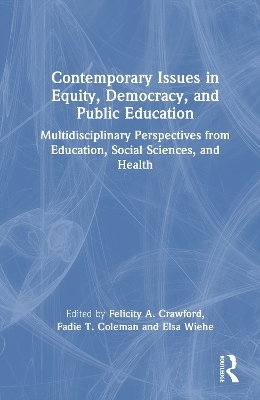
Contemporary Issues in Equity, Democracy, and Public Education
Routledge (Verlag)
978-1-032-76574-7 (ISBN)
- Lieferbar (Termin unbekannt)
- Versandkostenfrei innerhalb Deutschlands
- Auch auf Rechnung
- Verfügbarkeit in der Filiale vor Ort prüfen
- Artikel merken
Contemporary Issues in Equity, Democracy, and Public Education explores how inequity manifests in public education and social institutions, and how this inequity impacts the health and wellbeing of citizens, including marginalized people. Demonstrating how inequity thereby threatens democracy, this book also poses suggestions for improving equity in U.S. education.
Taking a multidisciplinary approach to historical and contemporary sources of inequity that operate in social institutions and public policy, this carefully curated volume shows how disparities in education levels, income, housing, and health have consequences that reverberate through individuals’ lives, and thereby undermine a democratic way of life. Contributions from a wide variety of experts offer approaches to solving these problems, as well as curricular innovations for identifying and alleviating systemic inequities. Part 1 begins by examining the origins and persistence of systemic inequity in U.S. public education, while Part 2 highlights the physiological, psychological, and social impacts of systemic bias, and how these factors interrupt democratic engagement over time. Moving on to examine the curriculum in more detail, Part 3 explores how we can promote equity across the curriculum, and Part 4 closely considers how we can expand educational opportunities for marginalized groups within STEM education.
The book will make invaluable reading for graduate students and researchers in Education – particularly Social Justice Education, Multicultural Education, Educational Policy and Politics, STEM Education, and Social Studies Education – as well as policymakers, in-service teachers, administrators, and activists.
Felicity Crawford is Clinical Associate Professor at Wheelock College of Education and Human Development, Boston University, USA. Fadie T. Coleman is Assistant Dean for Diversity, Equity, Inclusion, and Belonging at Harvard School of Dental Medicine, USA. Elsa Wiehe is Program Manager for the African Studies Center K-16 Education Program, Boston University, USA.
1. Introduction: The Case for Emphasizing Equity in Public Education as a Means of Sustaining Democracy Part 1: Origins and Persistence of Systemic Inequity in U.S. Classrooms 2. The Burden Our Children Bear: The Legacy of Eugenic Ideology 3. Towards Inclusive Education: Ableism and Democratizing Access 4. Whatever Happens to Any Child in Early Childhood Education, Better Be the Business of All of Us: Creating Equitable Learning Communities for Black Boys 5. Incentivizing Equity in Education 6. The Banning Years 7. Whiteness and Colonization in Higher Education: Barriers to Institutional and Societal Change Part 2: The Physiological, Psychological, and Social Consequences of Systemic Bias, and Its Incompatibility with Democracy 8. Chronic Stress-Related Disorders and the Possible Epigenetic Mechanisms 9. Inflammation in Pregnancy and its Role in Poor Gestational Health 10. Implementing a Social Justice Framework into Education Systems of Care 11. Food as a Basic Right 12. Between Hypervisibility and Invisibility: Unpacking What it Means to be an HSI on Indigenous Lands Through Critical Unearthing of Local Histories and Epistemologies of Latinx Communities Part 3: Rethinking the Curriculum to Promote Equity in Curriculum and Practice 13. Dismantling Oppression and Cultivating Resistance and Hope When Serving Immigrant Latin American Children and Families 14. U.S. History, Racial Capitalism, and Settler Colonialism 15.Decolonizing the Curriculum for Reparative Justice, Psychological Liberation, and National Healing 16. Chaos Or Community: Teaching for Democracy in an Era of Uncertainty 17. Teaching Transformative Citizenship in Schools: A Pathway to Promoting Equity and Preserving Democracy Part 4: A Closer Look at Expanding Educational Opportunities for Previously Excluded Groups in STEM 18. Ratcheting Equity 19. Democratizing STEM: Developing a Culture of Sensemaking 20. Environmental Health Literacy for Indigenous Youth: Implementing the Power of Relationality and Place-Based Knowledge to Promote Equity Through Collective Action 21. Re-examining Success in STEM: Why Equity and Sense of Belonging are Critical to Democracy 22. Leading for Equity
| Erscheinungsdatum | 24.12.2024 |
|---|---|
| Zusatzinfo | 9 Tables, black and white; 6 Halftones, black and white; 6 Illustrations, black and white |
| Verlagsort | London |
| Sprache | englisch |
| Maße | 152 x 229 mm |
| Themenwelt | Geisteswissenschaften ► Psychologie ► Pädagogische Psychologie |
| Sozialwissenschaften ► Pädagogik ► Allgemeines / Lexika | |
| Sozialwissenschaften ► Pädagogik ► Bildungstheorie | |
| ISBN-10 | 1-032-76574-7 / 1032765747 |
| ISBN-13 | 978-1-032-76574-7 / 9781032765747 |
| Zustand | Neuware |
| Informationen gemäß Produktsicherheitsverordnung (GPSR) | |
| Haben Sie eine Frage zum Produkt? |
aus dem Bereich


